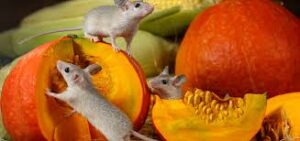Table of Contents
ToggleWhat do mice eat? Mice, especially house mice and deer mice, are opportunistic feeders that can grow in various environments due to their adaptable diets. These rodents consume a wide range of foods, including grains, seeds, and fruits, but they aren’t picky. Understanding their eating habits is vital for preventing a mice infestation. By limiting access to food sources, such as crumbs, leftovers, and unsecured pantry items, you can help prevent mice in homes and reduce the risk of mice property damage. Knowing what attracts them is key to effective rodent control and mice prevention.
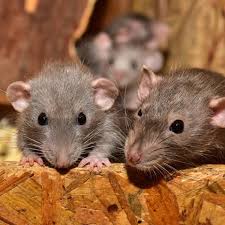
What Do Mice Eat?
Mice are omnivorous eaters, consuming both plant and animal-based foods. But what do mice eat most often? They typically prefer plant-based items like grains, fruits, and seeds, which makes them highly adaptable to different environments. House mice and deer mice are perfect examples of this adaptability, adjusting their diets based on available food sources.
In the wild, deer mice consume seeds, nuts, fruits, and insects, while house mice favor grains and seeds, especially in homes where food like bread, cereals, and pet food are easily accessible. Mice are particularly drawn to high-carb foods like grains and nuts, which provide the energy they need to stay active. This opportunistic eating behavior allows them to grow in both indoor and outdoor environments.
Mouse Diet in Different Environments
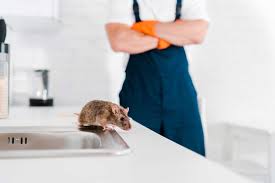
Mice in Homes
Mice frequently enter homes in search of easy meals like cereals, pet food, and leftovers. They are attracted to poorly stored food and crumbs, making mice in homes a common problem. Their ability to find hidden food sources leads to persistent mice infestations if not properly addressed.
Mice in the Wild
In natural settings, house mice and deer mice primarily feed on seeds, plants, and insects. This varied mouse diet allows them to thrive in both rural and urban environments, adapting to whatever food is available.
By understanding their diet, you can better manage rodent control and prevent mice infestations in homes.
Foods That Attract Mice
Mice are attracted to foods high in carbohydrates, such as grains, seeds, and sweets. If you’re wondering what do mice eat, these easily accessible items, along with pet food and leftovers, are common culprits that can lead to infestations.
| Food | Why It Attracts Mice |
| Grains & Cereals | High-carb foods like grains, bread, and cereals provide easy energy for mice. |
| Sweets & Sugary Items | Mice are drawn to sugary foods like chocolate, candy, and baked goods. |
| Pet Food | Dry and wet pet food is easy for mice to access and is full of nutrients. |
| Leftover Food Scraps | Crumbs and food left out or in trash bins are easy meals for mice. |
| Nuts & Seeds | High-fat foods like nuts and seeds are a favorite for mice to hoard. |
Foods and Items That Repel Mice
Certain foods and items naturally repel mice due to their strong scents. Peppermint, ammonia, citronella, and cloves are highly effective in keeping mice at bay. These odors overwhelm their senses, making the environment less attractive. Using these items around entry points or potential nesting areas can help deter mice and prevent infestations.
| Item/Food | Why It Repels Mice |
| Peppermint | The strong scent of peppermint overwhelms a mouse’s sense of smell. |
| Ammonia | Mice avoid the pungent smell of ammonia, which mimics the scent of predators. |
| Citronella | This natural oil is known to deter mice due to its strong odor. |
| Cloves | The strong spice scent is unpleasant for mice, making them steer clear. |
| Mothballs | Mice dislike the smell of mothballs, which are often used in storage areas to repel them. |
Signs of a Mouse Infestation
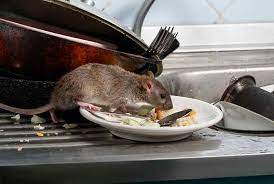
Identifying the Signs of a Rodent Infestation early is crucial to preventing further damage. Here are some key indicators:
- Droppings: Small, dark, rod-shaped mouse droppings often found in kitchens, cupboards, and along walls are one of the most common signs of a mice infestation.
- Gnaw Marks: Mice constantly chew on surfaces like wood, plastic, and wires. These gnaw marks can cause significant damage to mice property damage, particularly when they chew through electrical wires, which may result in fire hazards.
- Damaged Food Containers: If you notice holes or bite marks on food packaging, it’s a clear sign of a mouse infestation. Mice chew through food containers in search of food, which often leads to contaminated supplies.
- Nests: Mice build nests using shredded materials like paper, fabric, and insulation. Finding these nests, usually hidden in dark corners or behind appliances, is a sure sign of mice in homes.
- Foul Odor: A strong, musky odor caused by mouse urine is often present during an infestation. This odor marks their territory and is a common indicator of a mice infestation.
- Oily Rub Marks: As mice repeatedly travel the same paths, they leave greasy smudge marks along walls and baseboards. These are caused by the oils in their fur rubbing off on surfaces.
- Scratching Noises: You may hear scratching or scurrying sounds in walls, ceilings, or attics, which is a clear sign of mice nesting habits.
These signs not only indicate an active mice infestation but also highlight the need for Mice Extermination in Brampton. Addressing these signs early is critical to preventing serious structural damage to your home, including issues with wiring, insulation, and contaminated food.
Mice and Property Damage: More Than Just Food Eaters
Mice property damage isn’t just about what do mice eat. Beyond food, mice chew through electrical wires, insulation, and wood, leading to fire hazards and costly repairs. Their constant gnawing while searching for nesting materials can damage walls, wiring, and insulation, affecting your home’s safety and efficiency.
If you notice signs of a mice infestation, it’s crucial to act fast. Professional pest control services can effectively eliminate the problem and prevent further damage, saving you from expensive repairs in the future.
Rodent Control Solutions with Vanquish Pest Control
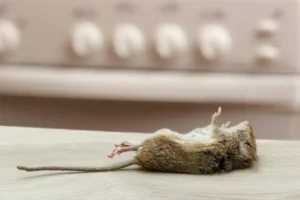
At Vanquish Pest Control, we specialize in efficient rodent control to protect your home and business. Wondering what do mice eat? Mice are attracted to easily accessible food like grains and scraps, leading to infestations. Our team uses proven methods to eliminate rodents and prevent further mice property damage.
With years of expertise, we ensure lasting protection from rodents. Choose Vanquish for reliable, customized solutions that keep pests out for good. Contact us today for trusted pest control services.
FAQs
What is the favorite food of house mice?
- House mice prefer high-carb foods such as grains, seeds, and nuts, which provide energy for their constant activity. While they can eat fruits and vegetables, these are secondary to their favorite carb-rich snacks, making pantries and cupboards common targets.
What do deer mice eat in the wild?
- In their natural habitat, deer mice consume a diverse diet of seeds, fruits, nuts, and insects. They are known for storing food, especially in colder months, which helps them survive through harsher seasons.
Do mice eat cheese?
- Contrary to popular belief, mice do not favor cheese. They prefer grains and nuts due to their high carbohydrate content, which gives them more energy. Cheese is often eaten only when other food options are scarce.
How can I detect a mouse infestation?
- Signs of a mouse infestation include droppings, gnaw marks on food containers or wiring, and damaged food. You may also hear scratching noises or notice greasy rub marks along walls where mice frequently travel.
What types of food attract mice the most?
- Mice are attracted to easily accessible foods like grains, cereals, sweets, and pet food. They will take advantage of anything left out or improperly stored, making thorough cleaning and food storage essential for mice prevention.
How can I protect my home from property damage caused by mice?
- To prevent mice property damage, keep food in airtight containers, regularly clean to avoid crumbs, and seal any entry points like cracks in walls. For ongoing issues, professional Pest Control Services are recommended to safely eliminate infestations and prevent further damage.

